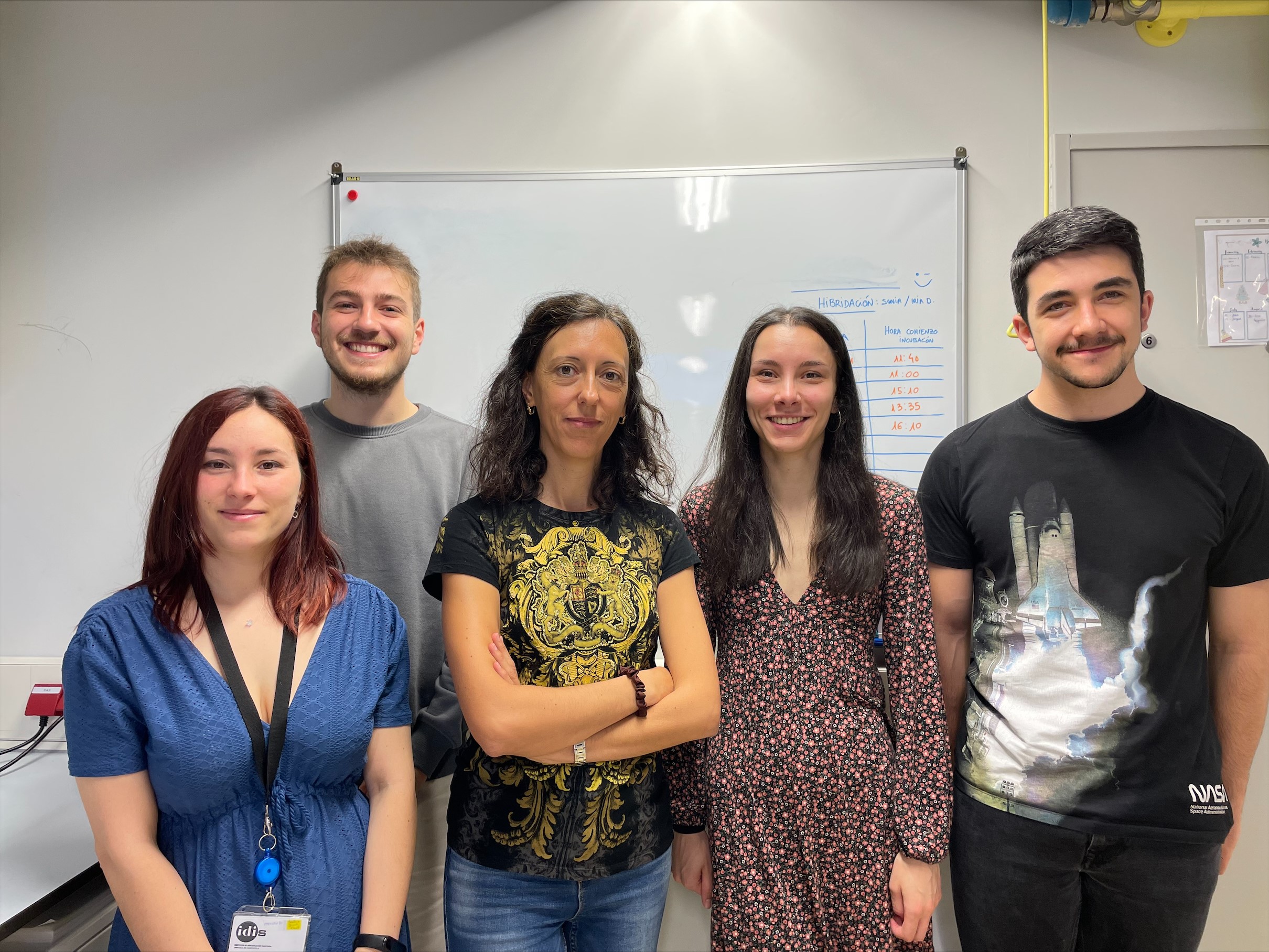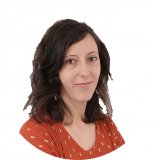Immunity and Small Molecules Lab
PI: Iria Gómez Touriño

Immunity and Small Molecules Lab Team
Our lab is focused in understanding the molecular mechanisms of autoimmunity, and how small molecules could be involved in both fostering and/or disrupting the functioning of the immune system. They constitute powerful drugs as they easily cross cell membranes, increasing the number of druggable targets but, at the same time, their small size and chemical features make them a potential source of immune disruption. In fact, many metabolites, toxins, food additives and drugs are of small size, and could be involved in the worrying global increase of the incidence of immune-related diseases.
We have extensive experience and expertise in both basic and translational research, as well as in animal models of autoimmunity, and we previously identified a portfolio of novel and repurposed small molecules with previously unknown anti-inflammatory properties. Their advantage with regards to other immunotherapies such as monoclonal antibodies is their small size, which allows them to be administered orally, potentially increasing patient adherence. We are now in the process of validating them ex vivo in Rheumatoid Arthritis and Type 1 Diabetes patients, and in vivo in mouse models, as a previous step to proceeding to preclinical and clinical trials.
We have also extensively worked in studying the molecular mechanisms driving Type 1 Diabetes, in particular identifying novel T-cell epitopes and T cell receptor features which constitute biomarkers of the disease. We now aim to go a step further, looking for the potential role of small molecules in the pathogeny of Type 1 Diabetes.

Left: Objectives of the Halt!Inflamm project. Right: anti-inflammatory effect of compound 13 in inflammed PBMCs
-
Team leader
Associate Professor. University of Santiago de Compostela
Principal Investigator of the Immunity and Small Molecules Lab
Postdocs and PhD
Postdoc Researcher
PhD in Biomedicine
PhD Student
MSc in Biomaterials
Undergraduate Students
Bachelor's Degree in Biotechnology
Bachelor's Degree in Biotechnology
Publications:
- Oscar J Cordero, Irene Viéitez, Irene Altabás, Laura Nuño-Nuño, Alejandro Villalba, Marta Novella-Navarro, Diana Peiteado, María-Eugenia Miranda-Carús, Alejandro Balsa, Rubén Varela-Calviño,
Iria Gomez-Tourino
, José M Pego-Reigosa. Study of Plasma Anti-CD26 Autoantibody Levels in a Cohort of Treatment-Naïve Early Arthritis Patients. Arch Immunol Ther Exp 2022. Mar 18;70(1):12
- Sefina Arif; Iria Gomez-Tourino; Kamra Y, Pujol-Autonell I, Hanton E, Tree T, Melandri D, Hull C, Wherrett DK, Beam C, Roep BO, Lorenc A, Peakman M. GAD-Alum immunotherapy in type 1 diabetes expands bi-functional, Th1/Th2, autoreactive CD4 T cells. Diabetologia 2020. Jun;63(6):1186-1198.
- Calviño-Sampedro C, Gomez-Tourino I , Cordero OJ, Reche PA, Gómez-Perosanz M, Sánchez-Trincado JL, Rodríguez MÁ, Sueiro AM, Viñuela JE, Calviño RV. (* Both authors contributed equally to this work). Naturally presented HLA class I-restricted epitopes from the neurotrophic factor S100-β are targets of the autoimmune response in type 1 diabetes. FASEB J. 2019 May;33(5):6390-6401.
- Gomez-Tourino I, Kamra Y, Baptista R, Lorenc A, Peakman M. T cell receptor β-chains display abnormal shortening and repertoire sharing in type 1 diabetes. Nat Commun 2017 Nov 27;8(1):1792.
- Brian D. Stadinski, Karthik Shekhar,Iria Gómez-Touriño, Jung J, Sasaki K, Sewell AK, Peakman M, Chakraborty AK, Huseby ES. Hydrophobic CDR3 residues promote the development of self-reactive T cells. Nat Immunol. 2016 Aug;17(8):946-55.
- A. Das, K. Rouault-Pierre, I. Gomez-Tourino, K. Wood, I. Donaldson, C. A. Mein, D. Bonnet, A. C. Hayday, D. L. Gibbons. Adaptive from Innate: Human IFN-γ+CD4+ T Cells Can Arise Directly from CXCL8-Producing Recent Thymic Emigrants in Babies and Adults. J Immunol. 2017 Sep 1;199(5):1696-1705.
- Cristina Calviño-Sampedro, Iria Gómez-Tourino, Varela-Calvino R, Cordero OJ. Apportioning blame: autoreactive CD4+ and CD8+ T cells in Type 1 Diabetes. Arch Immunol Ther Exp 2017 Jan 12; 65(4):275-284.
- Gomez-Tourino I, Arif S, Eichmann M, Peakman M. T cells in type 1 diabetes: Instructors, regulators and effectors: A comprehensive review. J Autoimmun. 2016 Jan;66:7-16.
- Menno van Lummel, Peter A. van Veelen, Arnoud H. de Ru, Jos Pool, Tanja Nikolic, Sandra Laban, Antoinette Joosten, Jan W. Drijfhout, Gomez-Tourino I, Sefina Arif, Henk J. Aanstoot, Peakman and Bart O. Roep. Discovery of an exclusive islet-peptidome presented by the highest-risk HLA-DQ8trans molecule. Diabetes. 2016 Mar;65(3):732-41.
- Iria Gómez-Touriño, Simón-Vázquez R, Alonso-Lorenzo J, Arif S, Calviño-Sampedro C, González-Fernández Á, Pena-González E, Rodríguez J, Viñuela-Roldán J, Verdaguer J, Cordero OJ, Peakman M, Varela-Calvino R. Characterization of the autoimmune response against the nerve tissue S100β in patients with type 1 diabetes. Clinical Exp Immunol. 2015 May;180(2):207-17.
- Menno van Lummel, Gaby Duinkerken, Peter A. van Veelen, Arnoud de Ru, Robert Cordfunke, Arnaud Zaldumbide, Iria Gómez-Touriño, Sefina Arif, Peakman, Jan W. Drijfhout, Bart O. Roep. Post-translational modification of HLA-DQ binding islet-autoantigens in type 1 diabetes. Diabetes. 2014 63(1):237-47.
-
Gómez-Touriño I
, Sánchez-Espinel C, Hernández-Fernández A, González-Fernández A, Pena-González E, Rodríguez J, García-López JM, Varela-Calvino R. Galectin-1 synthesis in type 1 diabetes by different immune cell types: reduced synthesis by monocytes and Th1 cells. Cell Immunol. 2011; 271(2):319-28.
- Gómez-Touriño I, Camiña-Darriba F, Otero-Romero I, Rodríguez MA, Hernández-Fernández A, González-Fernández A, Pena-González E, Rodríguez J, Rodríguez-Segade S, Varela-Calvino R. Autoantibodies to glial fibrillary acid protein and S100beta in diabetic patients. Diabet Med. Feb 2010; 27(2):246-8.
Funding::
“Characterization of novel small molecules with anti-inflammatory capabilities for the treatment of rheumatoid arthritis (Halt!Inflamm)”. Spanish Ministry of Science and Innovation-Carlos III Institute of Health (Jan 2022-Dec 2024).







